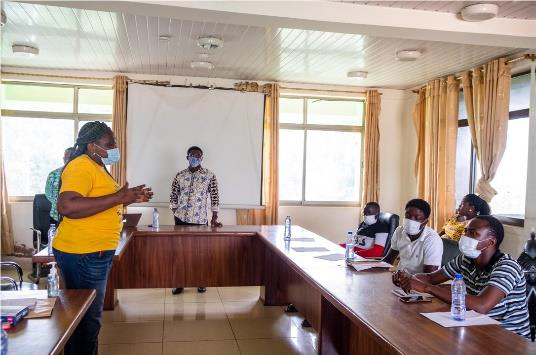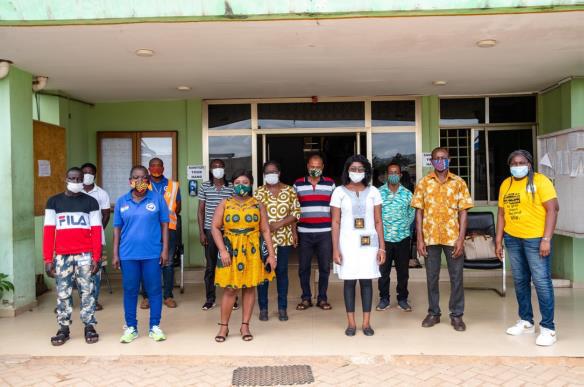By Ms. Betty Osei Bonsu and Dr. Dzidzo Yirenya-Tawia
The Ga-East Municipal Assembly in collaboration with the Institute for Environment and Sanitation Studies (IESS) under the College of Basic and Applied Sciences, University of Ghana, Green Africa Youth Organization and the Bola Taxi and Aboboya Association have initiated activities to formalize the activities of the informal waste workers in the Municipality. This comes at the time where the urgent need to formalize the informal waste sector has been identified as paramount to sustainable waste management in the Municipality.
Informal waste workers contribute to municipal waste management in many ways. They are the collectors of waste in hard to reach areas in the municipality, recover various waste types, plastics, metals etc. for the recycling industry, while providing income generating opportunities for large numbers of poor people (UN-HABITAT 2010). Yet, their activities are considered illegal and some recalcitrant informal waste workers engage in indiscriminate dumping creating nuisance in the communities and tensions between the municipal assembly and the informal waste workers. Consequently, the environmental and economic contributions of informal workers to local governments, local communities, and value chains in many ways are unrecognized. Nevertheless, existing evidence show the contribution of the informal sector in waste management is substantial. Rather than marginalize them, the Ga East Municipality through interactions with IESS and GAYO are working together on the Cleaning Up from the Bottom Project to facilitate the formalization of the informal waste collectors in the municipality.
Informal Waste Workers and Municipal Assembly Officers Brainstorm
IESS and GAYO organized a stakeholders’ meeting, bringing together the Municipal Assembly and representatives of the informal waste workers to strategize on best ways to regulate the informal waste sector the Municipality. Additionally, the meeting explored advocacy strategies to promote collaboration between formal and informal waste actors in the Municipality.
The meeting was facilitated by Dr. Dzidzo Yirenya-Tawiah and Mr. Tony Tsekpetse of IESS. The Head, Municipal Health and Sanitation Department, Mr. Charles Asabre welcomed the meeting by acknowledging the role of the informal sector in waste management in the Municipality. He stressed the need to formalize their activities and for which reason they have agreed and are happy to work to work with the informal sector to achieve this. The informal sector represented by Mad. Lydia Bamfo the National President, Mr. Foster Ayagah, National Organizer, Mr. Kofi Bentil, Mr. Nurudeen Musah and Mr. Bless Sampson all expressed the willingness to work with the Municipality and contribute their quota to developing a sustainable management system. GAYO was represented by Ms Betty Osei-Bonsu and Mr. Nicholas Adatsi.
It is hypothesized that, the integration of informal waste workers into the municipality structure will boost the social image of the Municipal Assembly, make room for further public participation toward waste management and create a platform to attract both internal and external support for both the informal waste sector and the municipal assembly. The meeting focused mainly on developing structures for regulating informal sector activities and strengthening advocacy for the work of informal waste sector
The meeting which took place on 29 April 2020 at the Ga East Municipality saw the participation of 18 stakeholders from these sectors. The discussion among stakeholders took place in two sections: open forum and groupings (informal waste workers and the Municipality).

The open forum centred on the following; (i) The absence of a regulatory system for the informal waste sector. (ii) The willingness of the informal sector to engage with the Assembly. (iii) The challenges faced by the informal sector in conducting their duties. (iv) Nuisances caused by the informal sector when conducting their work. (v) The readiness of the assembly to engage the informal sector and their immediate plan of using a task force to commence their registration. (vi) The informal waste collectors were not considered in PPE distribution in the COVID -19 outbreak even though they are in direct contact with waste and can easily be infected.
There were several problems identified by the informal waste workers. Regardless of context specificities, some of the problems that stood out were insecurities, health and safety challenges, and infrastructural limitations (non-existence of dumpsites).
Outcome and Next Steps
The brainstorming group addressed the questions - how to engage, who to engage, what support can be given, and when to engage. Both the informal and formal groups outlined their expectations of engagement and strategies they propose to implement. At the end of the discussions an action plan was drawn together with all the stakeholders present on the next steps for regularization.
While the outcomes for both parties are exciting, the potential limitation of time, misunderstanding, disagreements, and funding were identified as possible drawbacks to progress. All stakeholders committed to ensuring the process succeeds. The support of CSO’s such as GAYO and media to advocate for the development of an inclusive, non-tokenistic and equity-based system was requested.

